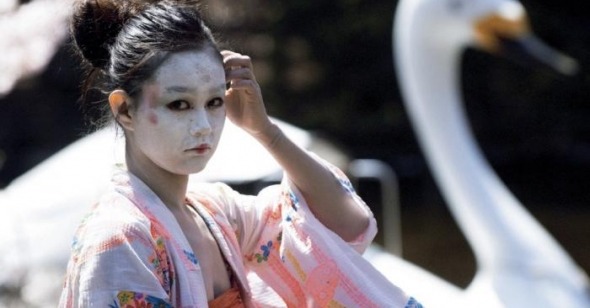Early Spring
by Jeff Reichert
Cherry Blossoms
Dir. Doris Dorrie, Germany, Strand Releasing
German filmmaker Doris Dorrie plays the Ozu card to the hilt in Cherry Blossoms. Riffing on Tokyo Story, she sends her elderly married protagonists, Rudi (Elmar Wepper) and Trudi (Hannelore Elsner), from their small hamlet in Bavaria to visit two of their three adult children in Berlin (their remaining son lives in Tokyo), only to find themselves generally ignored and passed around by their uncomfortable, city-slicker offspring. For Trudi, the trip has special significance as the film opens with a pair of doctors informing her that Rudi is sick and has little time left, a fact she keeps secret from her husband so that she can bring him closer to his family without unnecessary pressure in his final days.
Left adrift by their children, the two leave Berlin early and head to the seaside to finish their vacation. When Trudi unexpectedly dies at the resort, Rudi’s left to reconcile with a family his famously organized persona (his mantra, uttered always in English: “An apple a day keeps the doctor away”) hasn’t made much room for. Dorrie proves adept here at striking a tentative balance between the recrimination of children who felt Trudi was penned in by her husband’s rigidity and the bonds that undergird any family, no matter how estranged. Wepper ably anchors the proceedings. Where an English-language remake featuring Tom Wilkinson would necessarily feature panting and googly eyes, the German actor doles out little character tics—a breakdown in a cafe, an unexpected hug or touch, a gift of food brought from a continent away—sparingly over the course of the following coming-to-awareness narrative, which takes him to visit son Klaus in Tokyo, a city Trudi always longed openly and actively to visit.
After a few days of listless sitting in son Klaus’s tiny apartment and a night of unexpected drinking and disconsolate carousing at sex clubs, Rudi meets a young butoh dancer, Yu (Aya Irizuki), also nursing the loss of a loved one. (Trudi had been obsessed with butoh in her lifetime, and even went so far as to take lessons until Rudi discouraged her.) What begins as an awkward mess of cross-cultural mispronunciations in halting English turns into a genuine memorial for the lost. Set amidst the transient beauty of cherry blossom season, their encounters form a welcome respite from the ongoing drama of paternal estrangement and never overwhelm with the weight of heavy metaphor. Dorrie takes such care with the lovely pillow shots of the trees, blossoms, and lake (welcome views for the grimness of this New York January) that it makes the less beatific aspects of the film seem more conspicuous—shots throughout of her characters placed directly against over-exposed windows suggest nuclear devastation more than angelic warmth. Some of the impetus behind Cherry Blossoms was to shoot quickly, in a more natural, “documentary” style, but in many instances filmmakers seem to forget that “documentary” doesn’t need to be synonymous with “looks bad.”
Thankfully, the icky May-December romance the scenario promises never materializes. Yu escorts Rudi to Mount Fuji and the two ensconce themselves in kimonos at a bed and breakfast to wait for the mountain to reveal itself from behind heavy cloud banks; each night sleeping in separate beds placed far apart. The mountain’s eventual emergence sparks Rudi to his own stab at butoh; joined by Trudi, it’s a surprisingly touching performance that’s a minor miracle for not having gone mawkish. Their dance would make for a perfectly lilting conclusion, so it’s something of a letdown to sit through the ten minutes of buzz-kill coda that follow. Lovely as it often is, Cherry Blossoms would have been well-served by following the path of its namesake flower and been a hair more fleeting.
